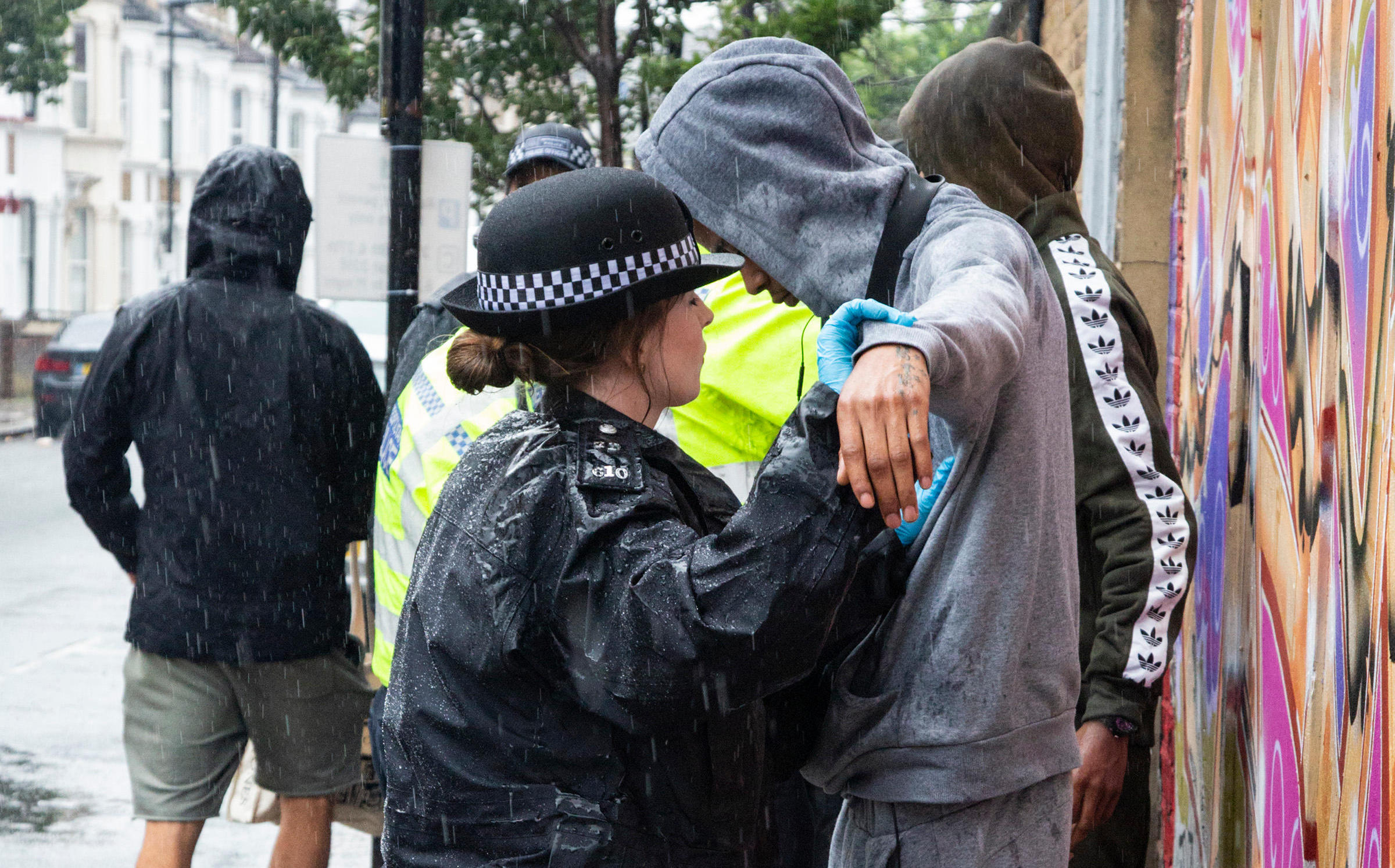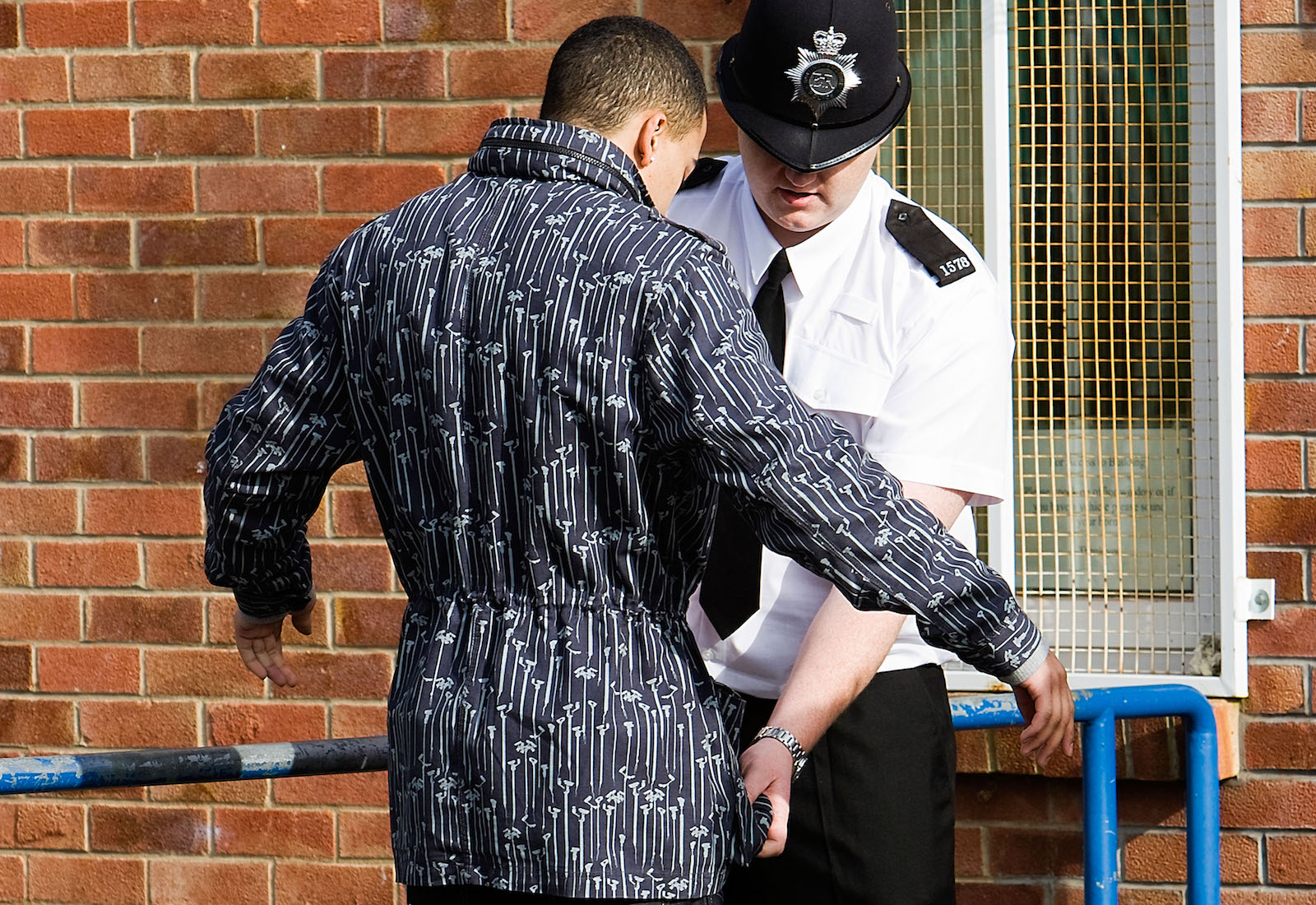A former chief inspector has said he believes that over a third of drug stop-and-searches by UK police are used “as an excuse to harass people”, after VICE News analysis showed that officers are using the powers as a pretext to punish or exert control, rather than to find drugs.
Despite a 2011 decision to rein in stop-and-search because so many Black and Asian people were being targeted, the tactic is back on the rise after a surge in knife crime.
There was a sharp jump in the number of searches between 2017/18 and 2018/19, from 250,000 to 384,000. Despite the coronavirus lockdown, that figure has skyrocketed in London, increasing by 103 percent in the year up to May of 2020. Almost 60 percent of all stop-and-searches carried out by the Met Police last year were of people aged 24 or under.
These numbers are driven by the pursuit of drugs. Police say they have increased stop-and-search to deal with knife crime, but in the first seven months of this year only a fifth of Met Police searches were for weapons, while almost two-thirds (65.3 percent, representing 134,496 searches – a 50 percent rise on last year) were for drugs. Drugs are also the leading cause for use of the powers by police forces across the country, disproportionately affecting Black and Asian men.
Yet, according to experts, many “drug searches” are not about drugs at all.
Nick Glynn, a former chief inspector with 30 years’ service at Leicestershire Police, told VICE News he believes that over a third of drug searches – of which the Met Police carried out 200,000 in the last year – are used as a tool to intimidate people, instead of to find drugs.
“A certain proportion of drug searches are carried out by police for reasons of control and as an excuse to harass and bully people, rather than search for drugs,” said Glynn, who has been a national lead on stop-and-search for the College of Policing, and is now a policing expert at the Open Society Foundations.
“I would estimate that a third of drug searches are to find drugs, a third are to get their hands in people’s pockets to look for other things, such as stolen goods or weapons, and a third are to exert control, to show who is in charge. Police don’t like feeling undermined or that they’re not in charge of the streets. If people undermine that, one way of demonstrating they have control is by drug searches.”

For someone who has nothing to do with drugs, Londoner Ryan Colaço has a grim habit of being stopped by the police for them.
On the 23rd of May, Ryan’s BMW was tailgated by police before he was pulled over, handcuffed and searched for drugs. Officers said they could smell cannabis, but no drugs were found.
This was nothing new to Ryan, a 30-year-old Asian man who works as a film location scout. He’d been stopped around 20 times before, so started filming his encounters with police and posting them on social media.
On the 29th of May, days after George Floyd was killed by police officers in Minneapolis, Ryan was driving home after being interviewed on TV about his experience of racist policing, when his car was again stopped by police.
It was another drug search. He told the officers he did not take drugs and was scared of being handcuffed. So they smashed his windscreen with truncheons, dragged him from his car, slammed him against a brick wall and went through his pockets. They took him back to the station to strip search and drug test him. Nothing was found and he was released 12 hours later, to receive his smashed-up car from the pound.
A subsequent police standards investigation found the stop-and-search was lawful, but confessed the car should have been tidied up before it was returned.
Ryan’s experience of questionable police stop-and-search tactics is a familiar story, particularly for Black people in the UK, whether you’re a nurse, a gold medal athlete, an ambulance driver, a cyclist or an MP.
According to police data, nationally, only around 15 percent of stop-and-searches find anything worthy of making an arrest. Because Black people are up to ten times more likely to be stop-and-searched than white people, even though they are no more likely to be caught with anything, these inefficient fishing expeditions have left the police’s reputation among the Black community in tatters.
Nick Glynn said that, “without any doubt”, drug searches disproportionally target Black and Asian people, socially disadvantaged areas and young men, giving police “an unlimited pass” to use the powers.
“With drug searches, you can make up the grounds,” he said. “The easiest grounds for searching people is to say someone smelled of cannabis, because you can’t prove me wrong. If you combine that with what is called ‘failing the attitude test’ – or what police would call being evasive, nervous, uncooperative – that can justify a street search for many officers.”
Police officers are unofficially incentivised to carry out stop-and-searches, according to Glynn: “There is an unwritten rule in the police that if you want to get a onto specialist teams you need to demonstrate that you are proactive, and the number of stop-and-searches is part of that. It may not be written down, but in briefings serving police officers have told me they are given targets and encouraged to stop-and-search and give out fixed penalty notices for cannabis.”
This assertion is backed up by statistics from the charity Stopwatch, which estimates that more than a third of all stop-and-searches are for suspected cannabis possession offences. Even though officers must have a strong suspicion to legally undertake drug searches, three in four result in zero drugs being found.
Last year, Gavin Hales – a senior associate fellow at the Police Foundation – observed it was likely drug searches were being routinely used by police to hunt for weapons, because drugs provide stronger grounds for searching people, and police presume that anyone carrying a knife will also be carrying some weed.
Hales spoke to several Met Police officers who confirmed this theory, and concluded that while some weapons would be found using these tactics, they pose a threat to the police’s legitimacy and that searches would be more successful if they were based on police intelligence rather than assumptions.
Another policing expert, Ben Bradford, Professor of Global City Policing at UCL’s Jill Dando Institute of Security and Crime Science, told me he believes the mass use of drug stop-and-searches is more misguided than cynical. He said police chiefs think that by picking people up, even for small amounts of drugs such as cannabis, they are tackling street violence.
“As an institution, the police suffers from the mistaken idea that there is a correlation between using cannabis and serious crime, and that if you use drugs you are more likely to be involved in violent crime,” he said. “So they will search for drugs, not just to find drugs, but to reduce violent crime.”
Bradford said that this mantra is not coming from individual officers, but from senior staff. “Some police, off the record, would agree it’s a waste of time targeting recreational drug users,” he said. “However, most officers I speak to genuinely believe they are doing the right thing, because they are told that searching people for drugs will reduce violent crime. So it’s difficult to persuade them to do anything else, and the upshot is marginal impact on crime with perverse outcomes – bad community relations. It’s a bad habit not just for police, but for society too.”

One of the problems with the police’s attitude is that stop-and-searches can often escalate into people being strip searched, handcuffed and put in a cell just for questioning the grounds of a search. This happens to children, too. During 2017 and 2018, the Met Police strip searched almost 1,000 people aged 17 and under, nearly half of whom had been stopped for drugs. In Nottinghamshire – where, in 2019, 80 percent of all stop-and-searches were for drugs – a quarter of stops ended with people being handcuffed, even though only one in ten were actually arrested.
Ryan Colaço told me he believes police are using drug stop-and-searches as a tool to get inside people’s heads, not just into their pockets. He said he’s initially stopped because of the colour of his skin, but that things quickly escalate to a “punishment” drug search after he questions officers’ approach or refuses to show the correct degree of respect. As criminologists describe it, he’s searched for “failing the attitude test”.
“The way I’m spoken to, it’s heavy handed,” Ryan said. “If I see this, I’ll question it, and that’s what they don’t like – that’s why they drug search me. But these searches are done to harass me, not to find drugs. They just think, because you are Black or brown, they have an excuse to search you for drugs. That’s the bar for them. They provoke people so they can search them for drugs.”
Ben Bradford agreed that “failing the attitude test” can result in drug searches. “That’s why Black families have the conversation with their kids, about how if you are stopped by police, don’t answer back,” he said.
While she was Prime Minister, Theresa May said, “Nobody wins when stop-and-search is misapplied.” And the evidence shows these powers are being misapplied to the detriment of tens of thousands of young people, who are unjustly searched each year. The bar must be raised, say experts, so that drug stop-and-searches are restricted to instances where police have a strong suspicion that someone is selling drugs, rather than just possessing them.
“Drug searches are ineffective, counterproductive and they are futile,” said Nick Glynn. “They have no impact whatsoever on drug use or drug supply, and they criminalise hundreds of thousands of people. The police officers are stuck because it’s the law. It’s a circular process that isn’t solving anything. We’ll have this problem until the UK catches up with other countries and reforms its drug laws – starting with the decriminalisation of possession of drugs for personal use.”
The Metropolitan Police did not immediately respond to a request for comment. This article will be updated if they respond.
For more information on what do do if you are stopped and searched by police, see this guide from Release.
from VICE US https://ift.tt/3h5Xrbq
via cheap web hosting
No comments:
Post a Comment